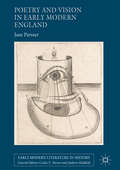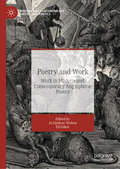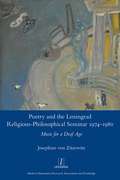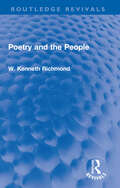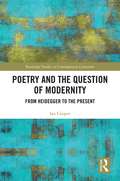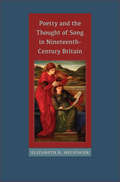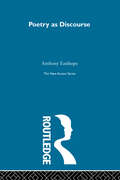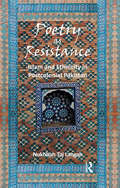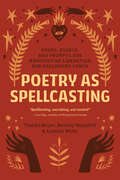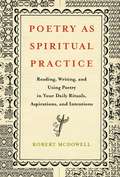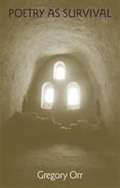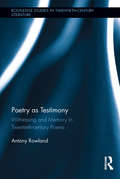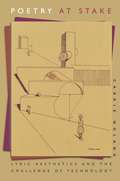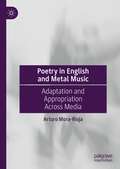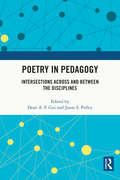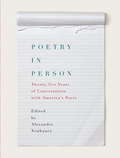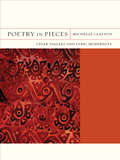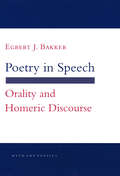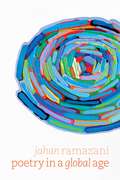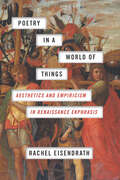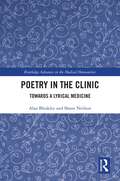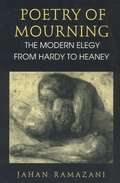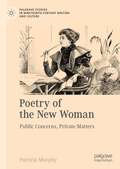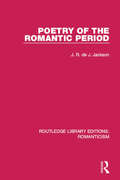- Table View
- List View
Poetry and Vision in Early Modern England (Early Modern Literature in History)
by Jane PartnerThis book reveals the ways in which seventeenth-century poets used models of vision taken from philosophy, theology, scientific optics, political polemic and the visual arts to scrutinize the nature of individual perceptions and to examine poetry’s own relation to truth. Drawing on archival research, Poetry and Vision in Early Modern England brings together an innovative selection of texts and images to construct a new interdisciplinary context for interpreting the poetry of Cavendish, Traherne, Marvell and Milton. Each chapter presents a reappraisal of vision in the work of one of these authors, and these case studies also combine to offer a broader consideration of the ways that conceptions of seeing were used in poetry to explore the relations between the ‘inward’ life of the viewer and the ‘outward’ reality that lies beyond; terms that are shown to have been closely linked, through ideas about sight, with the emergence of the fundamental modern categories of the ‘subjective’ and ‘objective’. This book will be of interest to literary scholars, art historians and historians of science.
Poetry and Work: Work in Modern and Contemporary Anglophone Poetry (Modern and Contemporary Poetry and Poetics)
by Jo Lindsay Walton Ed LukerPoetry and Work offers a timely and much-needed re-examination of the relationship between work and poetry. The volume questions how lines are drawn between work and non-work, how social, political, and technological upheavals transform the nature of work, how work appears or hides within poetry, and asks if poetry is work, or play, or something else completely. The book interrogates whether poetry and avant-garde and experimental writing can provide models for work that is less alienated and more free. In this major new collection, sixteen scholars and poets draw on a lively array of theory and philosophy, archival research, fresh readings, and personal reflection in order to consider work and poetry: the work in poetry and the work of poetry. Individual chapters address issues such as the many professions, occupations, and tasks of poets beyond and around writing; poetry’s special relationship with ‘craft’; work's relationship with gender, class, race, disability, and sexuality; how work gets recognised or rendered invisible in aesthetic production and beyond; the work of poetry and the work of political activism and organising; and the notion of poetry itself as a space where work and play can blur, and where postwork imaginaries can be nurtured and explored.
Poetry and the Leningrad Religious-Philosophical Seminar 1974-1980: Music for a Deaf Age (Legenda Ser.)
by Josephine von ZitzewitzThe Religious-Philosophical Seminar, meeting in Leningrad between 1974-1980, was an underground study group where young intellectuals staged debates, read poetry and circulated their own typewritten journal, called ‘37’. The group and its journal offered a platform to poets who subsequently entered the canon of Russian verse, such as Viktor Krivulin (1944-2001) and Elena Shvarts (1948-2010). Josephine von Zitzewitz’s new study focuses on the Seminar’s identification of culture and spirituality, which allowed Leningrad’s unofficial culture to tap into the spirit of Russian modernism, as can be seen in ‘37’. This book is thus a study of a major current in twentieth-century Russian poetry, and an enquiry into the intersection between literary and spiritual concerns. But it also presents case studies of five poets from a special generation: not only Krivulin and Shvarts, but also Sergei Stratanovskii (1944-), Oleg Okhapkin (1944-2008) and Aleksandr Mironov (1948-2010).
Poetry and the People (Routledge Revivals)
by W. Kenneth RichmondFirst published in 1947, Poetry and the People presents a survey of English poetry from the earliest times till 1940s, viewed from an unusual angle. It is the author’s thesis that English Poetry is unpopular, in the sense that it is not loved by the people, because the sources of its inspiration, which were originally drawn from the soil, were diverted during the Renaissance into aristocratic and academic channels. Nevertheless, the emerging traditions, though driven underground, survived in the work of such men as Burns, Hogg and Clare and in folk song. This book is a must read for scholars and researchers of English poetry and English literature.
Poetry and the Question of Modernity: From Heidegger to the Present (Routledge Studies in Contemporary Literature)
by Ian CooperInterest in Martin Heidegger was recently reawakened by the revelations, in his newly published ‘Black Notebooks’, of the full terrible extent of his political commitments in the 1930s and 1940s. The revelations reminded us of the dark allegiances co-existing with one of the profoundest and most important philosophical projects of the twentieth century—one that is of incomparable importance for literature and especially for poetry, which Heidegger saw as embodying a receptiveness to Being and a resistance to the instrumental tendencies of modernity. Poetry and the Question of Modernity from Heidegger to the Present is the first extended account of the relationship between Heidegger’s philosophy and the modern lyric. It argues that some of the best-known modern poets in German and English, from Paul Celan to Seamus Heaney and Les Murray, are in deep imaginative affinity with Heidegger’s enquiry into finitude, language, and Being. But the work of each of these poets challenges Heidegger because each appeals to a transcendence, taking place in language, that is inseparable from the motion of encounter with embodied others. It is thus poetry which reveals the full measure of Heidegger’s relevance in redefining modern selfhood, and poetry which reveals the depth of his blindness.
Poetry and the Thought of Song in Nineteenth-Century Britain (Victorian Literature and Culture Series)
by Elizabeth K. HelsingerIn arguing for the crucial importance of song for poets in the long nineteenth century, Elizabeth Helsinger focuses on both the effects of song on lyric forms and the mythopoetics through which poets explored the affinities of poetry with song. Looking in particular at individual poets and poems, Helsinger puts extensive close readings into productive conversation with nineteenth-century German philosophic and British scientific aesthetics. While she considers poets long described as "musical"--Alfred, Lord Tennyson, Gerard Manly Hopkins, Emily Brontë, and Algernon Charles Swinburne--Helsinger also examines the more surprising importance of song for those poets who rethought poetry through the medium of visual art: Dante Gabriel Rossetti, William Morris, and Christina Rossetti. In imitating song's forms and sound textures through lyric's rhythm, rhyme, and repetition, these poets were pursuing song's "thought" in a double sense. They not only asked readers to think of particular kinds of song as musical sound in social performance (ballads, national airs, political songs, plainchant) but also invited readers to think like song: to listen to the sounds of a poem as it moves minds in a different way from philosophy or science. By attending to the formal practices of these poets, the music to which the poets were listening, and the stories and myths out of which each forged a poetics that aspired to the condition of music, Helsinger suggests new ways to think about the nature and form of the lyric in the nineteenth century.
Poetry as Discourse: New Accents (New Accents)
by Antony EasthopeFirst published in 2002. Routledge is an imprint of Taylor & Francis, an informa company.
Poetry as Resistance: Islam and Ethnicity in Postcolonial Pakistan
by Nukhbah Taj LangahFocusing on the culturally and historically rich Siraiki-speaking region, often tagged as ‘South Punjab’, this book discusses the ways in which Siraiki creative writers have transformed into political activists, resisting the self-imposed domination of the Punjabi–Mohajir ruling elite. Influenced by Sufi poets, their poetry takes the shape of both protest and dialogue. This book reflects upon the politics of identity and the political complications which are a result of colonisation and later, neo-colonisation of Pakistan. It challenges the philosophy of Pakistan — a state created for Muslims — which is now taking the shape of religious fanaticism, while disregarding ethnic and linguistic issues such as that of Siraiki.
Poetry as Spellcasting: Poems, Essays, and Prompts for Manifesting Liberation and Reclaiming Power
by Tamiko Beyer Destiny Hemphill Lisbeth WhitePoems, essays, and prompts to sing a new world into being--Queer & BIPOC perspectives on poetry as an insurgent ritual for manifesting liberation and reclaiming power.Written for poets, spellcasters, and social justice witches, Poetry as Spellcasting reveals the ways poetry and ritual can, together, move us toward justice and transformation. It asks: If ritualized violence upholds white supremacy, what ritualized acts of liberation can be activated to subvert and reclaim power?In essays from a diverse group of contributing poets, organizers, and ritual artists, Poetry as Spellcasting helps readers explore, play, and deepen their creativity and intuition as integral tools for self- and communal healing and social change. Each section opens with a poem and includes prompts that invite the reader to engage more deeply with:Portals of Inheritance: Ancestral Teachings, Possible Futures opens portals to messages from ancestors and for survivalLanguages of Liberation, Disruption, and Magic explores how poetry and spellcasting allow us to enter into and harness language in active, heightened ways that both reflect reality and manifest alternatives.Invoking Radical Imagination leans into the incantatory possibilities of poetry as prayer and poetry as enchantment.Sacred Practices: Rituals of Repair and Revision explores writing as ritual, ritual as practice, and practice as doing, drawing connections between the creative practices of poetry and spellwork.Lighting Fires, Breaking Chains focuses on the explicitly magical and political nature of poetry as spellcasting.Elemental Ecologies, Spiritual Technologies wrestles with concepts of home, colonization, and belongingBoth poetry and occult studies have been historically dominated by white, cishet writers; here, Poetry as Spellcasting reclaims the centrality of queer and BIPOC voices in poetry, magic, and liberatory spellwork.
Poetry as Spiritual Practice
by Robert Mcdowell"[When we read and write poetry,] it is as if a long-settled cloud in our mind suddenly dissipates, and we are divine once again." -- from the Introduction Poetry is the language of devotion in prayer, chant, and song. Reading and writing poetry creates clarity, deepens and expands spiritual inquiry, and cultivates wisdom, compassion, self-confidence, patience, and love. In author Robert McDowell's words, poetry makes you into a tuning fork of the Divine. But poetry has disappeared over the centuries from religious ceremonies, academic curricula, and public discourse. In Poetry as Spiritual Practice, the first inspirational and instructional guide to combine poetry and spirituality, McDowell restores poetry as the natural language of spiritual practice and invites you to recognize poetry as "the pure sound and shape of your spirit." Vividly illustrated with a wide range of poems from all historical eras and poetic traditions, numerous religions and faiths, and McDowell's own and his students' work, Poetry as Spiritual Practice will reintroduce you to the unique pleasure of verse. And meditations throughout will allow you to integrate reading and writing poetry into your spiritual journeys and daily life. Since many of us have long forgotten, or never learned, the mechanics and terminology of poetry -- trochaic feet and tropes trip us up; we can't tell a villanelle from its shorter cousin, rondeau; and a terza rima may as well be a tanka -- this is also an instructional handbook on reading and writing poetry. An engaging guide through the landscape of world poetry, McDowell argues along the way for the many practical benefits of poetic literacy. Making poetry an essential part of daily rituals, aspirations, and intentions will put you on the path to greater meaning, growth, and peace in your life. At once an engaging technical primer, a profound meditation on the relationship between poetry and the Divine, and an inspirational guide for integrating poetry into spiritual practice, Poetry as Spiritual Practice will become a cherished companion.
Poetry as Survival (The life of poetry)
by Gregory OrrMore specifically, he considers how the acts of writing, reading, and listening to lyric bring ordering powers to the chaos that surrounds us. Moving into more contemporary work, Orr looks at the poetry of Sylvia Plath, Stanley Kunitz, and Theodore Roethke, poets who relied on their own work to get through painful psychological experiences.
Poetry as Testimony: Witnessing and Memory in Twentieth-century Poems (Routledge Studies in Twentieth-Century Literature)
by Antony RowlandThis book analyzes Holocaust poetry, war poetry, working-class poetry, and 9/11 poetry as forms of testimony. Rowland argues that testamentary poetry requires a different approach to traditional ways of dealing with poems due to the pressure of the metatext (the original, traumatic events), the poems’ demands for the hyper-attentiveness of the reader, and a paradox of identification that often draws the reader towards identifying with the poet’s experience, but then reminds them of its sublimity. He engages with the work of a diverse range of twentieth-century authors and across the literature of several countries, even uncovering new archival material. The study ends with an analysis of the poetry of 9/11, engaging with the idea that it typifies a new era of testimony where global, secondary witnesses react to a proliferation of media images. This book ranges across the literature of several countries, cultures, and historical events in order to stress the large variety of contexts in which poetry has functioned productively as a form of testimony, and to note the importance of the availability of translations to the formation of literary canons.
Poetry at Stake: Lyric Aesthetics and the Challenge of Technology
by Carrie NolandTaking seriously Guillaume Apollinaire's wager that twentieth-century poets would one day "mechanize" poetry as modern industry has mechanized the world, Carrie Noland explores poetic attempts to redefine the relationship between subjective expression and mechanical reproduction, high art and the world of things. Noland builds upon close readings to construct a tradition of diverse lyricists--from Arthur Rimbaud, Blaise Cendrars, and René Char to contemporary performance artists Laurie Anderson and Patti Smith--allied in their concern with the nature of subjectivity in an age of mechanical reproduction.
Poetry in English and Metal Music: Adaptation and Appropriation Across Media
by Arturo Mora-RiojaMany metal songs incorporate poetry into their lyrics using a broad array of techniques, both textual and musical. This book develops a novel adaptation, appropriation, and quotation taxonomy that both expands our knowledge of how poetry is used in metal music and is useful for scholars across adaptation studies broadly. The text follows both a quantitative and a qualitative approach. It identifies 384 metal songs by 224 bands with intertextual ties to 146 poems written by fifty-one different poets, with a special focus on Edgar Allan Poe, John Milton's Paradise Lost and the work of WWI's War Poets. This analysis of transformational mechanisms allows poetry to find an afterlife in the form of metal songs and sheds light on both the adaptation and appropriation process and on the semantic shifts occasioned by the recontextualisation of the poems into the metal music culture. Some musicians reuse – and sometimes amplify – old verses related to politics and religion in our present times; others engage in criticism or simple contradiction. In some cases, the bands turn the abstract feelings evoked by the poems into concrete personal experiences. The most adventurous recraft the original verses by changing the point of view of either the poetic voice or the addressed actors, altering the vocaliser of the narrative or the gender of the protagonists. These mechanisms help metal musicians make the poems their own and adjust them to their artistic needs so that the resulting product is consistent with the expectations of the metal music culture.
Poetry in Pedagogy: Intersections Across and Between the Disciplines
by Jason S. Polley Dean A. F. GuiThe essays compiled in Poetry in Pedagogy: Intersections Across and Between the Disciplines offer praxes of poetry that cultivate a community around students, language, and writing, while presenting opportunities to engage with new texts, new textual forms, and new forms of text-mediated learning. The volume considers, combines, and complements multiform poetry within and beyond existing Teaching & Learning paradigms as it traverses Asia, The Atlantic, and Virtual Space. By virtue of its mélange of intersecting trajectories, across and between oceans, genres, disciplines, and sympathies, Poetry in Pedagogy informs interdisciplinary educators and practitioners of creative writing & poetry involved in examining the multiform through international, cross-disciplinary contexts.
Poetry in Person
by Alexander Neubauer"In the fall of 1970, at the New School in Greenwich Village, a new teacher posted a flyer on the wall," begins Alexander Neubauer's introduction to this remarkable book. "It read 'Meet Poets and Poetry, with Pearl London and Guests.'" Few students responded. No one knew Pearl London, the daughter of M. Lincoln Schuster, cofounder of Simon & Schuster. But the seminar's first guests turned out to be John Ashbery, Adrienne Rich, and Robert Creely. Soon W. S. Merwin followed, then Mark Strand and Galway Kinnell.London invited poets to bring their drafts to class, to discuss their work in progress and the details of vision and revision that brought a poem to its final version. From Maxine Kumin in 1973 to Eamon Grennan in 1996, including Amy Clampitt, Marilyn Hacker, Paul Muldoon, Nobel laureate Derek Walcott, and U.S. poet laureates Robert Hass, Robert Pinsky, Louise Glück, and Charles Simic, the book follows an extraordinary range of poets as they create their poems and offers numerous illustrations of the original drafts, which bring their processes to light. With James Merrill, London discusses autobiography and subterfuge; with Galway Kinnell, his influential notion that the new nature poem must include the city and not exclude man; with June Jordan, "Poem in Honor of South African Women" and the question of political poetry and its uses. Published here for the first time, the conversations are intimate, funny, irreverent, and deeply revealing. Many of the drafts under discussion--Robert Hass's "Meditation at Lagunitas," Edward Hirsch's "Wild Gratitude," Robert Pinsky's "The Want Bone"--turned into seminal works in the poets' careers.There has never been a gathering like Poetry in Person, which brings us a wealth of understanding and unparalleled access to poets and their drafts, unraveling how a great poem is actually made.From the Hardcover edition.
Poetry in Pieces
by Michelle ClaytonSet against the cultural and political backdrop of interwar Europe and the Americas, Poetry in Pieces is the first major study of the Peruvian poet César Vallejo (1892-1938) to appear in English in more than thirty years. Vallejo lived and wrote in two distinct settings--Peru and Paris--which were continually crisscrossed by new developments in aesthetics, politics, and practices of everyday life; his poetry and prose therefore need to be read in connection with modernity in all its forms and spaces. Michelle Clayton combines close readings of Vallejo's writings with cultural, historical, and theoretical analysis, connecting Vallejo--and Latin American poetry--to the broader panorama of international modernism and the avant-garde, and to writers and artists such as Rainer Maria Rilke, James Joyce, Georges Bataille, and Charlie Chaplin. Poetry in Pieces sheds new light on one of the key figures in twentieth-century Latin American literature, while exploring ways of rethinking the parameters of international lyric modernity.
Poetry in Speech: Orality and Homeric Discourse (Myth and Poetics)
by Egbert J. BakkerApplying linguistic theory to the study of Homeric style, Egbert J. Bakker offers a highly innovative approach to oral poetry, particularly the poetry of Homer. By situating formulas and other features of oral style within the wider contexts of spoken language and communication, he moves the study of oral poetry beyond the landmark work of Milman Parry and Albert Lord.One of the book's central features, related to the research of the linguist Wallace Chafe, is Bakker's conception of spoken discourse as a sequence of short speech units reflecting the flow of speech through the consciousness of the speaker. Bakker shows that such short speech units are present in Homeric poetry, with significant consequences for Homeric metrics and poetics. Considering Homeric discourse as a speech process rather than as the finished product associated with written discourse, Bakker's book offers a new perspective on Homer as well as on other archaic Greek texts. Here Homeric discourse appears as speech in its own right, and is freed, Bakker suggests, from the bias of modern writing style which too easily views Homeric discourse as archaic, implicitly taking the style of classical period texts as the norm. Bakker's perspective reaches beyond syntax and stylistics into the very heart of Homeric—and, ultimately, oral—poetics, altering the status of key features such as meter and formula, rethinking their relevance to the performance of Homeric poetry, and leading to surprising insights into the relation between "speech" and "text" in the encounter of the Homeric tradition with writing.
Poetry in a Global Age
by Jahan RamazaniIdeas, culture, and capital flow across national borders with unprecedented speed, but we tend not to think of poems as taking part in globalization. Jahan Ramazani shows that poetry has much to contribute to understanding literature in an extra-national frame. Indeed, the globality of poetry, he argues, stands to energize the transnational turn in the humanities.Poetry in a Global Age builds on Ramazani’s award-winning A Transnational Poetics, a book that had a catalytic effect on literary studies. Ramazani broadens his lens to discuss modern and contemporary poems not only in relation to world literature, war, and questions of orientalism but also in light of current debates over ecocriticism, translation studies, tourism, and cultural geography. He offers brilliant readings of postcolonial poets like Agha Shahid Ali, Lorna Goodison, and Daljit Nagra, as well as canonical modernists such as W. B. Yeats, Wallace Stevens, T. S. Eliot, and Marianne Moore. Ramazani shows that even when poetry seems locally rooted, its long memory of forms and words, its connections across centuries, continents, and languages, make it a powerful imaginative resource for a global age. This book makes a strong case for poetry in the future development of world literature and global studies.
Poetry in a World of Things: Aesthetics and Empiricism in Renaissance Ekphrasis
by Rachel EisendrathWe have become used to looking at art from a stance of detachment. In order to be objective, we create a “mental space” between ourselves and the objects of our investigation, separating internal and external worlds. This detachment dates back to the early modern period, when researchers in a wide variety of fields tried to describe material objects as “things in themselves”—things, that is, without the admixture of imagination. Generations of scholars have heralded this shift as the Renaissance “discovery” of the observable world. In Poetry in a World of Things, Rachel Eisendrath explores how poetry responded to this new detachment by becoming a repository for a more complex experience of the world. The book focuses on ekphrasis, the elaborate literary description of a thing, as a mode of resistance to this new empirical objectivity. Poets like Petrarch, Spenser, Marlowe, and Shakespeare crafted highly artful descriptions that recovered the threatened subjective experience of the material world. In so doing, these poets reflected on the emergence of objectivity itself as a process that was often darker and more painful than otherwise acknowledged. This highly original book reclaims subjectivity as a decidedly poetic and human way of experiencing the material world and, at the same time, makes a case for understanding art objects as fundamentally unlike any other kind of objects.
Poetry in the Clinic: Towards a Lyrical Medicine (Routledge Advances in the Medical Humanities)
by Shane Neilson Alan BleakleyThis book explores previously unexamined overlaps between the poetic imagination and the medical mind. It shows how appreciation of poetry can help us to engage with medicine in more intense ways based on ‘de-familiarising’ old habits and bringing poetic forms of ‘close reading’ to the clinic. Bleakley and Neilson carry out an extensive critical examination of the well-established practices of narrative medicine to show that non-narrative, lyrical poetry does different kind of work, previously unexamined, such as place eclipsing time. They articulate a groundbreaking ‘lyrical medicine’ that promotes aesthetic, ethical and political practices as well as noting the often-concealed metaphor cache of biomedicine. Demonstrating that ambiguity is a key resource in both poetry and medicine, the authors anatomise poetic and medical practices as forms of extended and situated cognition, grounded in close readings of singular contexts. They illustrate structural correspondences between poetic diction and clinical thinking, such as use of sound and metaphor. This provocative examination of the meaningful overlap between poetic and clinical work is an essential read for researchers and practitioners interested in extending the reach of medical and health humanities, narrative medicine, medical education and English literature.
Poetry of Attention in the Eighteenth Century
by Margaret KoehlerBy identifying a pervasive cultivation of attention as a perceptual and cognitive state in eighteenth-century poetry, this book explores overt themes of attention and demonstrate techniques of readerly attention.
Poetry of Mourning: The Modern Elegy from Hardy to Heaney
by Jahan RamazaniCalled the "mother of beauty" by Wallace Stevens, death has been perhaps the favorite muse of modern poets.
Poetry of the New Woman: Public Concerns, Private Matters (Palgrave Studies in Nineteenth-Century Writing and Culture)
by Patricia MurphyThe New Woman sought vast improvements in Victorian culture that would enlarge educational, professional, and domestic opportunities. Although New Women resist ready classification or appraisal as a monolithic body, they tended to share many of the same beliefs and objectives aimed at improving female conditions. While novels about the iconoclastic New Woman have garnered much interest in recent decades, poetry from the cultural and literary figure has received considerably less attention. Yet the very issues that propelled New Woman fiction are integral to the poetry of the fin de siècle. This book – the first in-depth account on the subject – enriches our knowledge of exceptionally gifted writers, including Mathilde Blind, M. E. Coleridge, Olive Custance, and Edith Nesbit. It focuses on their long-neglected British verse, analyzing its treatment of crucial matters on both the personal and public level to provide the attention the poetry so richly deserves.
Poetry of the Romantic Period (Routledge Library Editions: Romanticism #18)
by J. R. JacksonFirst published in 1980. This title provides a critical and historical account of poetry written between 1780 and 1835. The author has been especially concerned to place the great poems and poets of the age in the context of the conventions and traditions in which they wrote, offering new perspectives on familiar works. Poems still famous are examined often in relation to works of a similar kind fashionable at the time but now neglected, and these unconventional groupings throw fresh light on Romantic poetry as a whole. An appendix is included, designed to be read as a supplement to the main text, serving both as a chronology and as a brief guide to works that do not fall within the scope of the main argument. This title will be of interest to students of literature.
